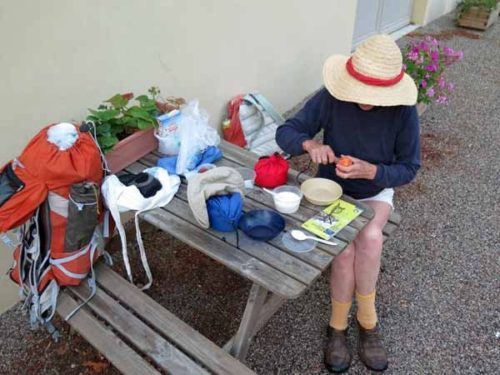
Friday, 27 June 2014
Distance 24 km
Duration 5 hours 20 minutes
Ascent 262 m, descent 408 m
Map 154 of the TOP100 lime-green series
We crept away from our campsite at 6:30 am but did not go far. Outside the office there were tables for people using the camping WiFi. These tables had been full of eager internet surfers yesterday, but now of course they were all empty.
We still had peaches from Lacapelle-Marival, so it was a slightly less drab breakfast than normal.
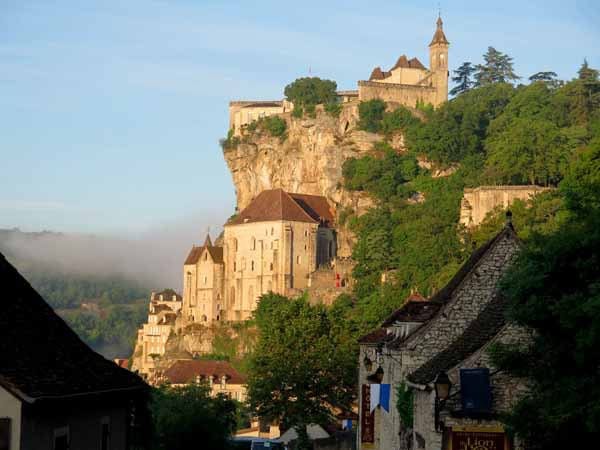
The Voie Sainte going down to Rocamadour proper was also conspicuously empty, and at the bottom the normally frantic shopping street was like a graveyard, but we prayed to St Amadour and by a miracle an open bar appeared.
It was just after 7 am, and we were their first customers, and probably their most grateful ones for the whole day.
Since the air was cold, we sat inside with only the barman for company, and I busied myself trying vainly to get the lens cap of my camera to close – it seemed to have a crumb or something jammed behind it.
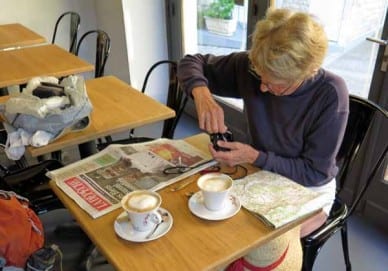
The coffee was hot and delicious but it was not the only unexpected pleasure. When I visited the toilets, I found that the seat was warmed by hot water pipes.
Continuing along the street, under the walls of the famous sanctuary, we were bailed up by an Englishwoman who wanted to help us find the Grand Escalier.
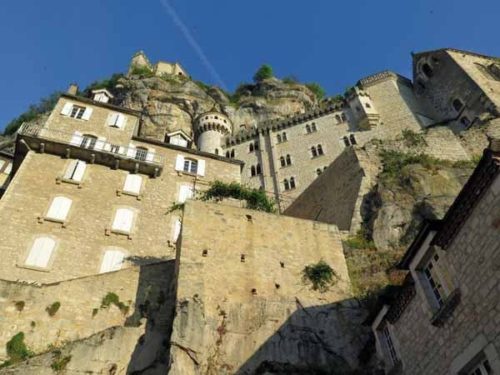
She had the same pressing, gushing evangelical zeal as the Frenchwoman at the church near Espalion. When we said that we were actually on the GR6, she had no idea what we were talking about, and so our parallel universes parted.
As we went down the little patched street, all the shiny tarted-up shop fronts, bunting, hoardings and tubs of flowers disappeared and it became a normal village lane. Then we passed under a stone portal and left the houses behind.
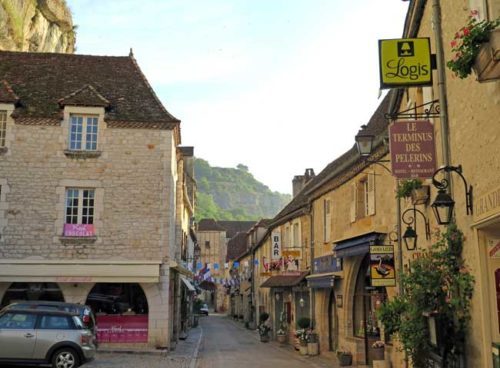
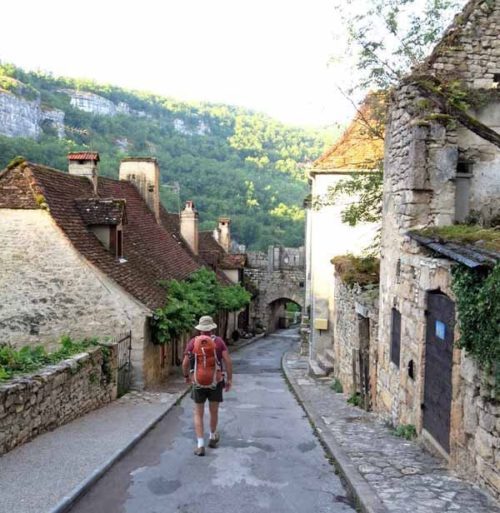
We had walked this way in 2003, on our way to Gourdon, and had largely forgotten it, but the memory of each bit unfolded as we came to it – a strange, dream-like sensation.
We walked initially on a wheel track under a line of cliffs, with a dry, starved looking grass ridge above.
When we came to a saddle, the GR veered off the dirt road and crossed into the catchment of the river Ouysse, although high above it.
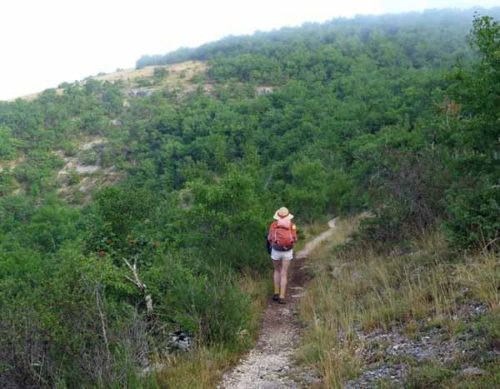
The path was now a thin white line across the face of the slope, sometimes in low scrub, sometimes through dense thickets of regrowth, or over bare rock.
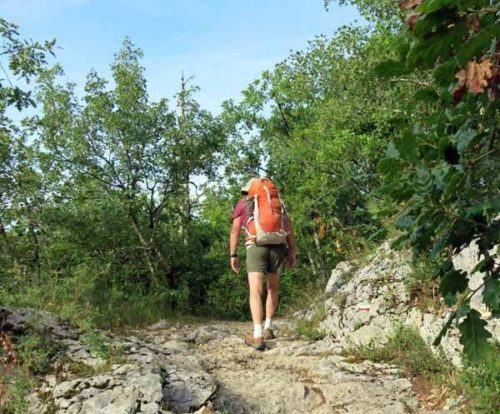
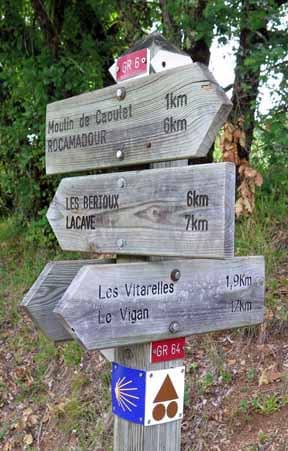
We descended to a road and here the GR6 (our one) diverged from the GR64 (the official variant of the pilgrimage from le Puy). The elaborate signpost that we had last seen in 2003 was still standing at the corner, in the middle of nowhere.
This time, instead of following our former footsteps over the stream, we continued along the flat river valley. Our way was now a narrow strip of tar beside fields of mown hay. It was a tranquil scene.
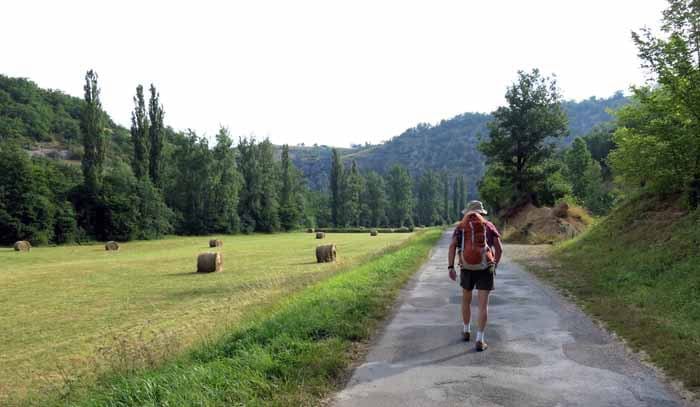
The cliffs closed in again but we remained below them and soon arrived at the Moulin de Cougnagnet, where the river was so jammed up against the cliffs that the road had to pass through a stone arch.

The enterprising owners had set up tables and chairs in the shelter of the overhang, but unfortunately there was nobody in sight to offer us coffee, or even a tour of the premises.
After this the road reverted to a dusty wheel track and we swung through a forest for half an hour, enjoying the feeling of remoteness that we often get in France despite evidence to the contrary. We had not seen a soul since leaving Rocamadour and it seemed impossible that we would.
When we came out of the forest, we found ourselves amongst hayfields again, and approaching the Dordogne, whose scrubby cliffs were getting very near. Houses appeared, and then we arrived at a T junction at the edge of the grand old river.
The signpost pointed right to the village of Lacave, but the GR pointed left. Also we had noticed a promising looking hotel over the water, so we took the left turn, crossed the Ouysse and strolled into the grounds of the hotel along a riverside drive.
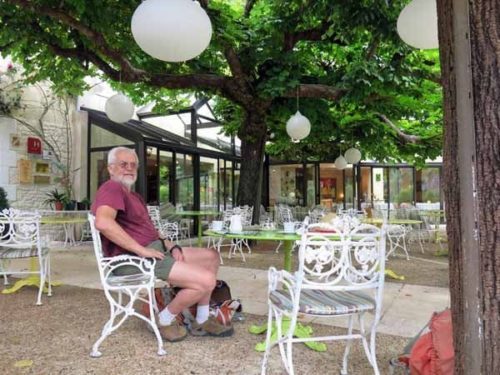
This brought us to the back entrance, where there were tables and chairs laid out on the gravel under an enormous chestnut tree.
The scene was adorned by beds of flowers, potted box plants clipped into balls and even a picturesque ruined bridge jutting out from both banks of the river (it could easily have been from mediaeval times, but was actually the result of a big flood in the 1960s).
Guests emerged towing their luggage and drove off, having presumably just finished breakfast.
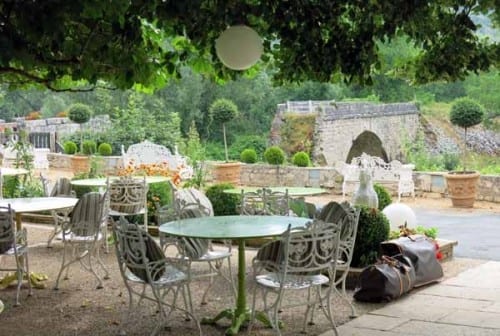
It was probably past the breakfast hour (10:30 am), but the elegant woman at the desk arranged for coffee to be sent out to us, complete with a jug of hot milk and a lustrous silver sugar bowl. It was expensive but worth every centime.
Pressing on, we climbed up very steeply behind the hotel, from which vantage point we could see the Château de Belcastel, surprisingly friendly and domesticated looking, on a bluff further up the river.
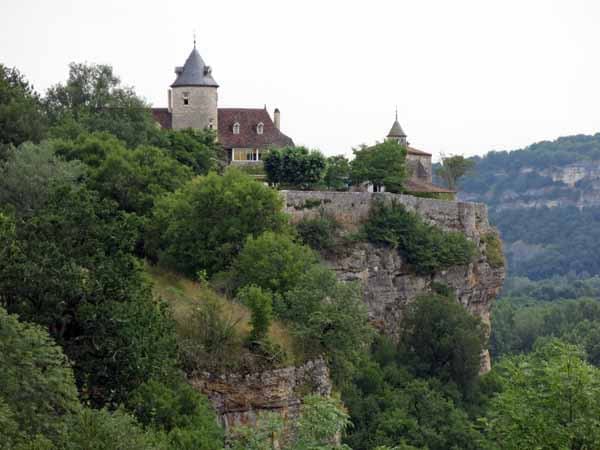
The road then continued through fields and orchards, but the GR turned off into a pine wood and plunged back to river level.
We were getting tired and decided to stay on the road, which was shorter and cut off a loop of the serpentine Dordogne on its way to the bridge.
A man who was tending his fruit trees called us over and invited us to pick some plums, advising us to go for the branches far away from the trunk, as the local foxes had scrambled up the trunk and taken what fruit they could reach.
French foxes are seemingly a more athletic lot than Australian ones.
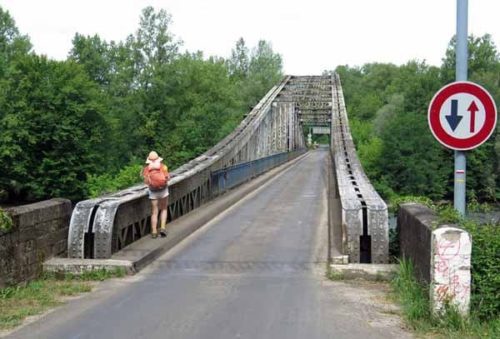
Before long the GR reappeared, the road descended and we crossed the river on a one-lane bridge.
Although we were on a road, it was a delightful walk, through a patchwork of woods and beautifully cultivated fields, many of them orchards.
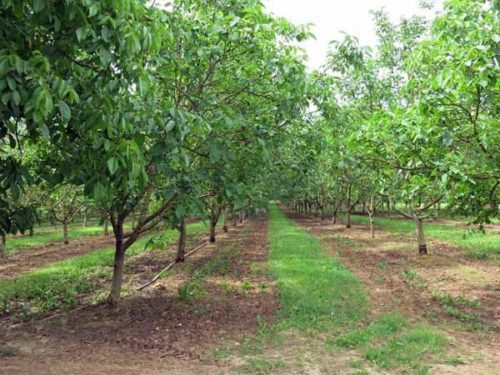
At the tiny village of Pinsac there was a shop beside the road and we went in, hopeful of getting some bread.
The man was just explaining that unfortunately he had run out, when the new supply arrived, so we bought a half-baguette. We were determined to have lunch today, for a change.
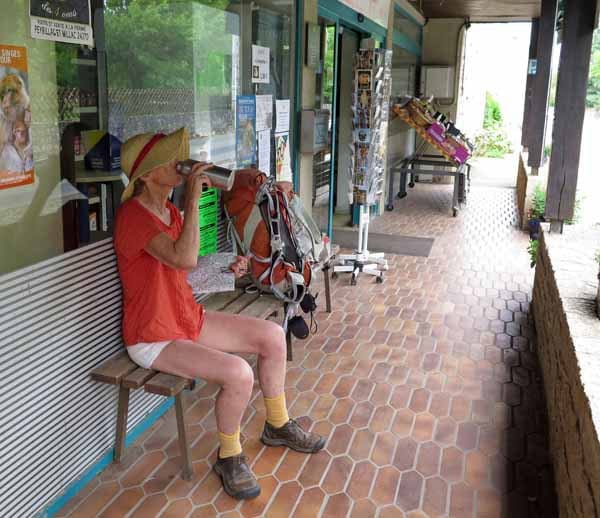
The next obstacle was the autoroute (the A20) but we crossed it almost without noticing, as it went into a tunnel under our little road. After that we were on the lookout for the GR turning off to the right, but we saw nothing.
The ground rose dramatically on that side and the only possible way off was the entrance to a quarry, with Private Property signs on it. Anyway, we did not fancy going up so high, when the road that we were on stayed comfortably beside the river.
As we approached Souillac, the road got quite a lot busier and it stopped being so enjoyable. It was a long haul to the bridge where the D820 came in, and another long haul through the outskirts of the town until we saw the sign to the Camping.
We had been to this camping ground before, but had arrived from the opposite direction, so we were nearly at the gates before we recognised anything, having walked past a dire looking fun fair called Quercyland.
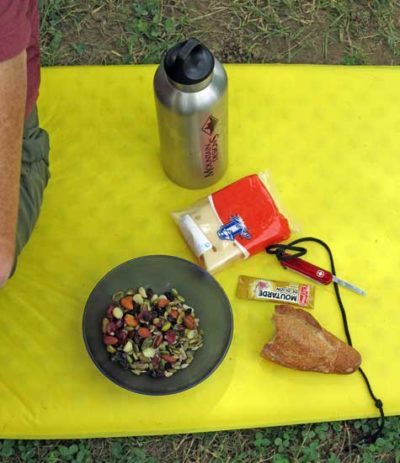
The place was enormous and full of vans. Clearly the grass had been newly planted not long ago and it was sparse and a bit muddy, but we found a fairly green spot near the hedge to set up our little misshapen tent.
Next to us was an even more misshapen one shaped like a small crescent moon, which we felt sure must belong to a fellow walker.
The showers were palatial, as so often in French camping grounds these days. Once ablutions were over we had the promised lunch – hardly a banquet, but more than we normally had – and then a glorious sleep on our mats.
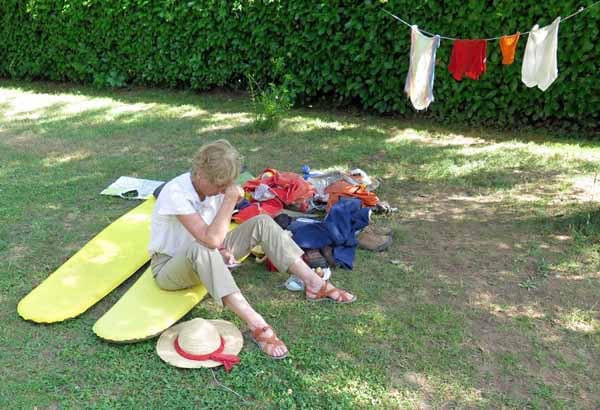
On our way to town we called at the office and paid €13 for the night, and Madame told us the short way to get there.
Following her advice, we popped out at the abbey, which had not changed noticeably since we were last here in 2005.
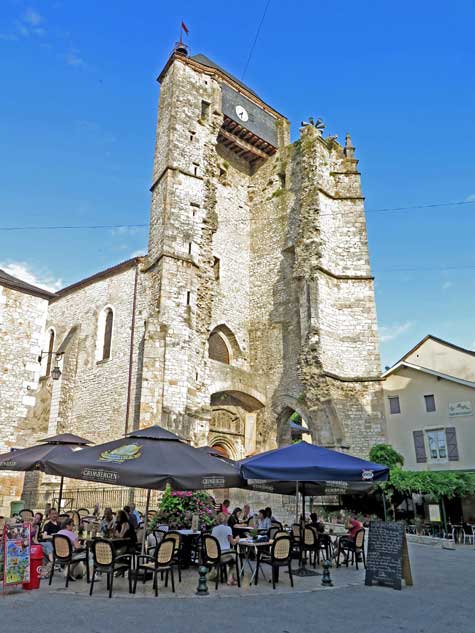
This was hardly a surprise – after all, what did nine years count, out of the nine hundred since it was built? The little lanes around the half-crumbled belfry also looked the same, and the square still seethed with cafés and bars.
But before settling into one of them we had to make a telephone call. Tomorrow’s walk would take us to the town of Cressensac, which had no accommodation except a hotel, so we wanted to make sure of a bed there. It went against our normal practice to book ahead, but we did not fancy a night of bread and water in a farmer’s field or under a hedge.
Having found a telephone box opposite the abbey, we rang the number and enquired. There was a short, worrying pause, then the man agreed that we could have a room. I told him that we would arrive on foot at about midday.
Greatly relieved, we made haste to a bar beside the belfry and indulged in a couple of glasses of rosé. There was a lot of English being spoken in various accents around us and we decided to look further afield for a restaurant.

Up on the main road we found a promising one (the Quercy), which did not seem to be so dominated by foreigners. The dining tables were at the back on a wooden deck, under a mass of umbrellas. There were also tables set inside but nobody was interested in them.
The menu was typical modest French fare. We started with Salades Parisiennes, loaded with cubes of ham and cheese which did not appeal to me, so I removed them from mine for a future lunch, and stowed them in the ever-ready plastic container in my handbag.
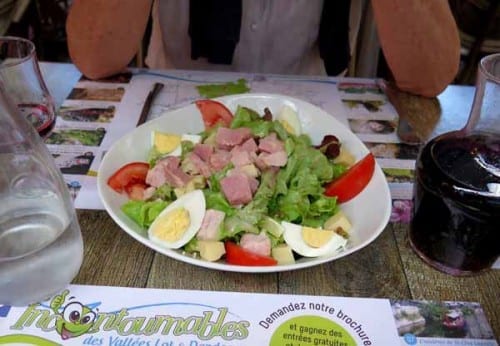
Following that we both had steaks with shallots. I forgot to ask for something other than chips, but they were freshly made, hot and not bad at all.
It was a very pleasant and satisfying end to our ramble across the Causse de Gramat.
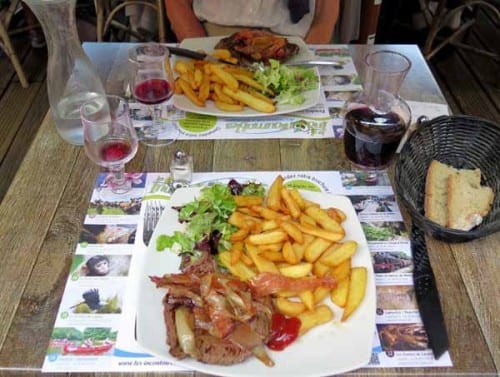
Leaving Souillac
Souillac has a railway station. From there you can go to almost anywhere in France.
If you have more time and energy, there is another beautiful walk of eight days from Souillac back to Rocamadour via a circuit of the Upper Dordogne.